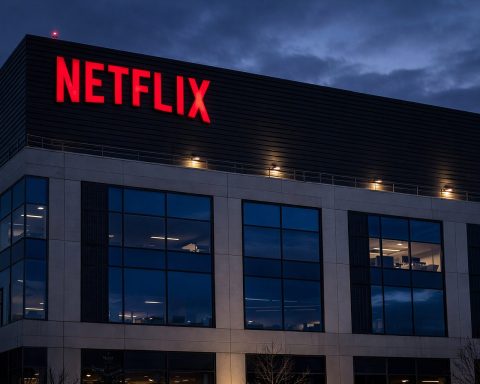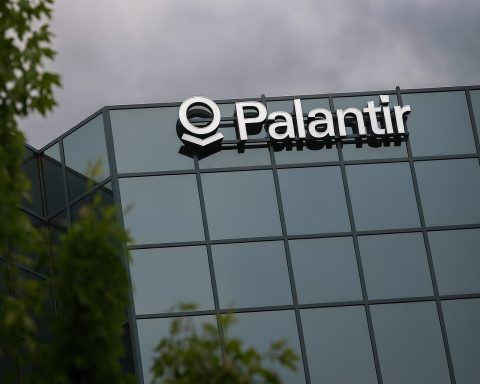Key Takeaways
- Broadcom’s AI Bonanza: Chipmaker Broadcom surged after forecasting strong AI chip demand, revealing a new $10 billion custom-chip order (widely believed to be from OpenAI) and beating revenue estimates reuters.com reuters.com. CEO Hock Tan affirmed he’ll stay on for 5 more years, boosting investor confidence (shares jumped ~4% after hours) reuters.com. An analyst noted that while Nvidia’s GPUs remain the default for AI, cloud giants are now turning to custom silicon like Broadcom’s to overcome bottlenecks reuters.com.
- Salesforce’s AI Reality Check:Salesforce stock plunged ~8% Thursday after a weak revenue outlook signaled that returns on its hefty AI investments will take longer to materialize reuters.com. The CRM leader’s guidance missed estimates despite an AI product push, prompting warnings that incumbent software firms may struggle to fully monetize AI in the near term reuters.com. Analysts called the outlook “uninspiring” amid a tough environment, even as Salesforce beefed up share buybacks reuters.com reuters.com.
- Atlassian’s $610M AI Browser Bet: Team-collaboration firm Atlassian announced a $610 million cash deal to acquire startup The Browser Company, maker of the AI-driven “Arc” and “Dia” browsers reuters.com. Atlassian shares dipped ~2% on the news as it enters a crowded field of AI-enabled web browsers that automate tasks. The move pits Atlassian against offerings like Nvidia-backed Perplexity’s Comet and Microsoft’s AI-infused Edge/Copilot, in a race to turn browsers into work hubs with built-in intelligence reuters.com reuters.com.
- Mixed Fortunes for AI Players: Enterprise AI software firm C3.ai suffered a 14% stock plunge, underscoring investor skittishness around unprofitable AI ventures. The company posted a wider loss and falling revenue (down 19% YoY) and shocked markets by withdrawing its guidance and replacing its CEO, founder Thomas Siebel stockanalysis.com stockanalysis.com. Siebel – now executive chairman – admitted sales execution was “inexcusable,” as management blamed poor execution for the growth shortfall stockanalysis.com. The shake-up raises questions about whether smaller AI specialists can capitalize on the boom.
- Global AI Momentum and Risks: The 48-hour window saw huge bets and policy moves tied to AI. Honeywell’s quantum computing unit Quantinuum raised $600 million from investors including Nvidia, doubling its valuation to $10 billion and highlighting crossover interest between AI and quantum tech reuters.com reuters.com. At the same time, President Donald Trump rattled chip markets by threatening tariffs on semiconductor imports from firms not moving production to the U.S. reuters.com – a move aimed at Asian chip giants (though companies like TSMC and Samsung are already investing in U.S. fabs to avoid penalties reuters.com). These developments underscore both the enormous capital flows into AI and the geopolitical undercurrents facing the industry.
Broadcom Rallies on AI Chip Windfall
Chip designer Broadcom (AVGO) emerged as a major winner this week, riding the AI hardware boom to new heights. On Sept. 4, Broadcom reported robust earnings and signaled that demand for its AI-focused semiconductors is exceeding expectations. Third-quarter revenue came in at $15.95 billion (topping forecasts of $15.83 B) and the company issued an upbeat forecast for the current quarter: about $17.4 billion in Q4 revenue versus the $17.0 B consensus reuters.com. CEO Hock Tan told analysts that AI-related sales will “improve significantly” in fiscal 2026, after Broadcom secured over $10 billion in orders for AI infrastructure chips from a new cloud client reuters.com. (Tan did not name the customer, but markets buzzed with speculation it is OpenAI, given a separate report of an OpenAI-Broadcom partnership in the works.)
Investors cheered Broadcom’s news, especially Tan’s announcement that – at 73 – he plans to continue leading Broadcom for at least five more years reuters.com. Tan is widely credited with transforming the company into one of the world’s most valuable chipmakers, so his commitment provided a sense of stability. Broadcom’s stock climbed 1.2% into Thursday’s close and ticked higher after hours once results hit, ultimately jumping about 4% in extended trading reuters.com. The optimism reflects Wall Street’s high expectations for AI-centric chip firms, which are rolling out ever-more powerful components to feed the AI craze reuters.com.
Notably, Broadcom’s earnings call hinted at a changing landscape in AI hardware. Tan said one of the big hyperscale cloud operators that had been “deeply engaged” in developing custom silicon with Broadcom placed a firm order last quarter, converting from prospect to paying customer reuters.com. In recent months Broadcom has pitched itself as a cheaper, customizable alternative to Nvidia’s off-the-shelf GPUs – and that pitch seems to be gaining traction. “While Nvidia’s GPUs remain the default choice, custom silicon can deliver niche performance gains that help break through bottlenecks,” observed Jacob Bourne, an analyst at Insider Intelligence reuters.com. In other words, cloud giants like Amazon, Google, and OpenAI are exploring specialized chips for specific AI workloads, and Broadcom (along with rivals like AMD) stands to benefit by co-designing those bespoke accelerators.
Broadcom’s booming AI business is helping offset softness elsewhere. Tan did flag weakness in non-AI segments – enterprise networking and storage – which saw sequential declines amid a murky macro environment reuters.com. But the company’s AI momentum is far outshining those headwinds. So far in 2025, Broadcom has launched cutting-edge products like its Tomahawk Ultra networking chip (vital for AI data centers) and is pushing ahead on custom AI silicon projects. Wall Street’s reaction suggests confidence that these bets will fuel rapid growth, even if parts of Broadcom’s legacy business slow.
OpenAI’s Secret Chip Project Emerges
One of the week’s most intriguing revelations was news that OpenAI, the firm behind ChatGPT, is developing its own AI chips – and Broadcom is at the center of that effort. The Financial Times reported that OpenAI plans to produce its first in-house AI processor by 2026 in partnership with Broadcom reuters.com. According to the FT (cited by Reuters), OpenAI would use the custom chips internally to power its AI models, rather than selling them, at least initially reuters.com. Neither OpenAI nor Broadcom confirmed the report, but it aligns with earlier leaks about OpenAI’s hardware strategy.
In fact, Reuters reported last year that OpenAI had been quietly working with Broadcom and TSMC on a custom AI chip, aiming to diversify its supply beyond Nvidia’s GPUs reuters.com. The startup’s voracious computing needs – and the sky-high cost of high-end GPUs – have apparently driven it to consider “going vertical” with its own silicon. Earlier this year, Reuters also noted OpenAI’s plan to reduce reliance on Nvidia by developing a first-generation chip design of its own reuters.com. Now, with the FT’s fresh details, it appears that plan is moving forward, potentially with Broadcom as the manufacturing and design partner.
For Broadcom, this is a double-edged development. On one hand, helping OpenAI build a proprietary chip would mean a massive new business opportunity – the rumored $10 billion order likely refers to OpenAI’s multiyear commitment for Broadcom to supply these custom accelerators reuters.com. It underscores Broadcom’s evolution into a key enabler of AI infrastructure. On the other hand, if OpenAI’s chip is successful, it could eventually lessen OpenAI’s dependence on off-the-shelf parts from Nvidia or even Broadcom’s standard offerings. In the near term, though, the news was greeted as a bullish validation of Broadcom’s role: Bloomberg reported that Broadcom’s stock “soared” on word of the $10B OpenAI partnership to develop AI chips bloomberg.com. The prospect of such a lucrative collaboration added fuel to Broadcom’s rally and exemplified how AI frenzy is reshaping industry alliances.
The OpenAI chip saga also highlights a broader trend: increasingly, big AI players want greater control over their hardware. Much as Google developed its TPU chips and Amazon has Graviton for servers, OpenAI appears to be taking its destiny in-house. If successful, this could influence other AI software firms (and their investors) to consider similar vertical moves. It’s a space to watch, as any progress by OpenAI on custom silicon could eventually impact the competitive balance among chipmakers – especially Nvidia, whose valuation and stock price have been predicated on being the indispensable supplier of AI computing. For now, Nvidia remains dominant, but OpenAI’s initiative – alongside Broadcom’s emergence as a custom silicon partner – shows that the AI hardware race is far from static.
Salesforce Faces AI Monetization Jitters
While chipmakers basked in AI’s glow, enterprise software leader Salesforce (CRM) offered a sobering counterpoint. The company’s stock tumbled almost 8% on Sept. 4 after Salesforce issued a disappointing revenue forecast for its upcoming quarter reuters.com. The guidance ($10.24–10.29 billion for Q3) came in barely at or below analysts’ estimates, signaling that the uplift from Salesforce’s much-touted AI features may take longer to materialize than bullish investors had hoped reuters.com.
The soft outlook was notable because Salesforce has aggressively promoted its new AI capabilities – from Einstein GPT to the “Agentforce” AI assistant launched in 2024 – as game-changers for its cloud software suite reuters.com. CEO Marc Benioff and team have spent billions on AI R&D and acquisitions, aiming to automate customer support, sales tasks, and more. Yet the “monetization” of these AI investments appears delayed, coming at a time when many enterprise customers are tightening IT budgets. As economic uncertainty leads clients to pull back on spending, even breakthrough tech can’t guarantee immediate revenue growth reuters.com.
Analysts didn’t mince words. Matt Britzman, senior equity analyst at Hargreaves Lansdown, said Salesforce’s outlook was “giving bears fresh ammo” amid fears that the software sector is ripe for disruption and questions over whether incumbents can fully monetize AI reuters.com. In other words, the results fed a narrative that established enterprise software vendors might struggle to convert AI hype into bottom-line gains, at least in the short run. Another brokerage, Oppenheimer, bluntly called Salesforce’s growth projection “uninspiring”, noting it reflects a “continuing tough macro environment” for front-office software providers reuters.com.
Salesforce tried to soften the blow by expanding its stock buyback program by $20 billion, a shareholder-friendly move reuters.com. But that wasn’t enough to offset concerns. Investors appear more worried that the company’s AI payback is farther out. Even though Salesforce beat earnings and revenue estimates for the past quarter, and trades at a valuation discount to peers like Microsoft or Oracle reuters.com reuters.com, its shares are down about 24% year-to-date reuters.com. That slump reflects not just broader tech weakness in August, but also skepticism about Salesforce’s ability to re-accelerate growth.
To regain momentum, Salesforce has hinted at a more acquisitive stance – it just made its first major acquisition in years (data platform Informatica for $8 billion in May) to bolster its product lineup reuters.com. The company’s bull case is that as AI features mature and prove their worth (e.g. boosting client productivity or enabling upsells), enterprises will eventually pay more, lifting Salesforce’s growth back to double digits. And with the stock now trading around ~21× forward earnings – cheaper than many cloud peers – some see upside if those AI investments bear fruit reuters.com. J.P. Morgan analysts argued that Salesforce’s recent results and upbeat commentary on its AI pipeline are “sufficient” for now, given the low valuation reuters.com.
Still, the sharp sell-off this week shows Wall Street’s impatience. In a market that has bid up anything AI-related, companies are under intense pressure to show tangible returns on their AI spend. Salesforce’s message was essentially “it’s coming, but not immediately,” and the market’s reaction was a reminder that patience is thin. Going forward, expect Salesforce to double down on proving its AI products can directly drive new revenue or efficiency gains for customers – and expect investors to scrutinize every metric for signs of that payoff.
Atlassian Makes a Bold AI Browser Play
Another significant development came from Atlassian (TEAM), which normally is known for its workplace collaboration software (like Jira and Confluence). On Sept. 4, Atlassian announced it will acquire startup The Browser Company of New York for $610 million in cash reuters.com. The deal marks Atlassian’s entrance into the nascent market for AI-powered web browsers – an unusual but intriguing expansion.
The Browser Company’s flagship product is “Arc,” a web browser that has gained buzz for reimagining the browser as a collaborative, productivity-centric space. More recently the startup also introduced “Dia,” billed as an agentic AI browser that can summarize web pages and even take actions for users via AI reuters.com. In other words, these browsers have built-in assistants to help with tasks like research, automation, and integrating web apps – aligning perfectly with Atlassian’s mission of improving workplace productivity.
Atlassian’s plan is to make Arc/Dia the go-to browser for work contexts, integrating it with Atlassian’s own tools and enterprise workflows reuters.com. Imagine a browser that not only displays your team’s Confluence wiki and Jira tickets, but also uses AI to draft status updates, schedule meetings, or analyze data, all within the browser. That’s the vision Atlassian is buying into.
The move comes as browsers become the latest front in the AI wars. Established players and startups alike are racing to infuse browsers with generative AI and automation. For instance, Microsoft’s Edge, bundled with its Copilot AI assistant, has quickly become popular in companies due to its seamless integration with Office 365 and security controls reuters.com. Niche competitors are cropping up too: Brave (the privacy-focused browser) introduced an AI assistant “Leo,” and startup Perplexity.ai – backed by Nvidia – recently launched “Comet,” an AI-native browser reuters.com. Even Google is reportedly exploring new AI features for Chrome as it defends its 69% market share in browsers reuters.com.
Given that backdrop, Atlassian’s purchase signals it doesn’t want to be left behind as browsers evolve from passive windows into active AI-driven workspaces. “Startups and incumbents are racing to embed agentic AI features into browsers, turning them into a workspace that summarizes pages and takes actions for users,” Reuters noted in its coverage of the deal reuters.com. Atlassian clearly sees strategic value in owning a browser platform to complement its suite of SaaS tools – especially one with novel AI capabilities.
Investor reaction was muted to mildly negative: Atlassian’s stock fell about 2% after the announcement reuters.com. Some of that could be general tech market noise, but it also suggests investors are taking a “show me” approach. A $610 million price tag is hefty for a pre-revenue startup (Arc’s user base is small, and it’s not yet monetized). There’s execution risk in integrating and scaling an entirely new product line. And the browser arena pits Atlassian against some formidable, deep-pocketed competitors (Microsoft, Google) in a way it hasn’t faced in its core business.
However, Atlassian has a history of savvy strategic moves. Notably, the company’s venture arm was an early investor in The Browser Company (participating in its $75 million Series A in 2023) reuters.com. So Atlassian knows the team and tech well. Other prominent investors included Salesforce Ventures and tech luminaries like Figma’s CEO – underlining broader enterprise interest in next-gen browsers reuters.com. With $2.5 billion in cash on hand, Atlassian can afford to make a bold bet here reuters.com. The acquisition is expected to close by year-end and isn’t projected to materially impact Atlassian’s near-term financials reuters.com.
If Atlassian successfully transforms the Dia browser into a secure, AI-augmented “work browser” integrated with its ecosystem, it could strengthen customer stickiness and even open new revenue streams (imagine premium AI features in the browser for enterprise clients). In the long run, this could differentiate Atlassian in the productivity software market. For now, it’s one of the more imaginative plays by a mid-sized tech company to ride the AI wave beyond its original domain, and it will be closely watched.
C3.ai’s Rough Ride Tests the AI Hype
No roundup of AI stocks would be complete without mentioning C3.ai (NYSE: AI) – the software company literally named after the trend. C3.ai has often been a proxy for AI stock sentiment among investors (sometimes to an extreme, given its meme-stock-like swings). Over the past two days, C3.ai delivered a stark reminder that not every AI-themed company is thriving in reality.
On Sept. 4, C3.ai’s shares plunged, at one point down over 14% in intraday trading stockanalysis.com, after the firm reported disappointing fiscal Q1 results (for the quarter ended July). The numbers were weak across the board: revenue fell to $70.3 million, down sharply from $87.2 M in the same quarter last year stockanalysis.com, and losses widened more than expected. Perhaps most damaging, C3.ai withdrew its prior full-year outlook, signaling uncertainty ahead stockanalysis.com. This coincided with a major leadership shakeup – founder/CEO Tom Siebel announced he is stepping aside, with newly-appointed Chief Executive Stephen Ehikian taking the helm to execute a turnaround stockanalysis.com.
The market’s reaction was swift and severe. By Thursday morning, C3.ai’s stock was not only reeling from the earnings miss but also digesting the abrupt CEO change and loss of guidance visibility. Shares that day closed around $15, a far cry from the $30–$40 range they hit during peaks of this year’s AI stock euphoria. Even after stabilizing Friday, C3.ai remains down over 50% year-to-date, reflecting a reversal of fortune after the stock’s big run-up earlier in 2025.
On the earnings call, Siebel – who will stay on as Executive Chairman – was candid about the company’s missteps. He acknowledged that C3.ai’s sales execution had been “inexcusable” in recent quarters, given the backdrop of surging AI interest stockanalysis.com. In other words, with demand for AI solutions booming, C3.ai still couldn’t capitalize due to internal issues (e.g. lengthy sales cycles, possible product gaps, or go-to-market inefficiencies). Management admitted “poor execution” was to blame for the growth reversal stockanalysis.com, and the board decided new leadership was needed. The incoming CEO, Ehikian, is tasked with revamping the sales strategy and focusing the product line, potentially emphasizing federal and defense sector opportunities (where C3 has had some traction) aol.com finance.yahoo.com.
Analysts and investors have grown increasingly critical. Even before these results, some on Wall Street had questioned C3.ai’s ability to convert AI hype into sustainable revenue, especially as big cloud platforms (Microsoft, Amazon, etc.) roll out competing AI offerings. The latest quarter’s 19% revenue drop – in a year when many AI companies are seeing demand surge – was a glaring red flag stockanalysis.com. The company’s decision to stop providing guidance only added to the uncertainty, often a sign that visibility is low or things aren’t going as hoped.
To be fair, C3.ai still has a healthy cash cushion (over $700 M) and zero debt, so bankruptcy isn’t an immediate concern. And the company touts a growing pipeline of pilot projects for its AI applications in oil & gas, manufacturing, and defense. But the market’s verdict this week was that C3.ai’s story needs a reboot. The stock’s steep slide, despite being one of the most famous “AI pure-plays,” shows that investors are differentiating between real results and hype. As one market observer noted, C3.ai’s stock has been “deservedly ‘battered’” given its performance, and only a convincing strategic turnaround under the new CEO will repair credibility stockanalysis.com stockanalysis.com.
The C3.ai saga also serves as a cautionary tale for the broader AI sector: lofty valuations can evaporate quickly if earnings don’t eventually catch up to the narrative. In late 2023 and early 2024, many AI and cloud software stocks rocketed on optimism; now, in late 2025, some of those same names are struggling as investors shift from speculative mode to show-me-the-results mode. Going forward, expect heightened scrutiny on every “AI stock” – whether it’s a mega-cap or a small-cap like C3 – to prove that demand and profits will follow the excitement.
Big Capital and Big Policy in AI: Funding Booms & Trade Tensions
Beyond individual companies, the past two days underscored two macro themes in the AI investment landscape: massive capital inflows into future-tech ventures and the growing role of government policy in the AI supply chain.
On the funding front, Honeywell International revealed a blockbuster raise for its quantum computing subsidiary Quantinuum that underscores how AI and quantum computing ambitions are intersecting. On Sept. 4, Honeywell announced that Quantinuum raised about $600 million from a roster of investors including Nvidia’s venture arm (NVentures), as well as firms like Quanta Computer and J.P. Morgan reuters.com reuters.com. The new round values Quantinuum at a whopping $10 billion – double its valuation from just early 2024 reuters.com. This is a staggering sum for a still-developing technology, reflecting hopes that quantum computers (which promise to solve complex problems exponentially faster than classical computers) will eventually revolutionize fields like cryptography, drug discovery, and yes, AI itself.
That Nvidia joined the round is telling. The GPU giant has been an aggressive player in AI, and now it’s staking a claim in quantum computing too. Nvidia even opened a dedicated quantum research lab in Boston earlier this year to collaborate with firms like Quantinuum reuters.com. The synergy is clear: if quantum computing breakthroughs emerge, they could supercharge AI model training or enable new AI algorithms. By investing now, Nvidia is both diversifying and ensuring it isn’t blindsided by the next wave of computing. For Honeywell, which still owns a majority of Quantinuum, the raise provides capital to accelerate R&D and sets the stage for a potential IPO by 2027 (Honeywell’s CEO has indicated plans to spin off Quantinuum down the road) reuters.com. In sum, the deal illustrates the continuing flood of money into AI-adjacent tech – investors are willing to bet big on the long-term winners of an AI-driven future, be it through direct AI plays or enabling technologies like quantum hardware.
Meanwhile, in Washington D.C., AI-related stocks and supply chains were reminded that geopolitics can be a wild card. On Sept. 4, U.S. President Donald Trump made waves by announcing plans to impose new tariffs on semiconductor imports from companies that don’t “come to America” and build plants domestically reuters.com. Speaking ahead of a dinner with top tech CEOs, Trump said, “We will be putting a tariff very shortly… a very substantial tariff” on chips made by firms that haven’t shifted production to the U.S. reuters.com. He explicitly cited “chips and semiconductors” and mentioned that if companies are investing in U.S. manufacturing, they would be exempt from the tariffs reuters.com.
This rhetoric is clearly aimed at non-U.S. chip giants – notably Taiwan’s TSMC and South Korea’s Samsung and SK Hynix, which manufacture the bulk of advanced chips overseas. It’s worth noting all three of those firms have ongoing projects to build or expand fabrication facilities in the United States reuters.com. (TSMC, for example, is constructing a major fab in Arizona.) Trump even quipped that Apple’s CEO Tim Cook was “in pretty good shape” – since Apple, while it designs chips in the U.S., relies on TSMC’s U.S.-bound investments for future supply reuters.com. Still, the tariff threat adds volatility and uncertainty for the semiconductor sector. Previous tariff moves during Trump’s terms have roiled supply chains and forced costly adjustments. If enacted, tariffs on imported chips could raise costs for device makers and cloud providers, or force more rapid localization of chip production (which is exactly Trump’s intent, to boost U.S. manufacturing and jobs).
Markets so far took the news in stride – perhaps because such a tariff would likely exempt key partners or be implemented gradually. But chip stocks with heavy Asia exposure (and tech hardware names) will be monitoring this closely. The development underlines how government policies – export controls, tariffs, subsidies – have become entwined with the AI boom, since so much of AI depends on global semiconductor trade. For instance, just last week investors were digesting new U.S. export restrictions on AI chip sales to China, which hit Nvidia’s shares. Now we have a tariff angle affecting imports. Companies in the AI ecosystem must navigate these shifting sands, balancing global supply chains with localization trends.
In China and Europe, related news percolated as well: Beijing reportedly moved to curb stock speculation (perhaps to cool an “AI bubble” in Chinese equities), and in Europe, a $3.1 billion deal saw Sweden’s Hexagon AB selling a division to U.S. chip-software firm Cadence Design, giving European tech stocks a lift reuters.com reuters.com. These items show that AI is reshaping markets worldwide – prompting consolidation, regulatory responses, and strategic realignments across continents.
Investor Sentiment: Euphoria Meets Reality
Taken together, the major AI-related stock news from September 4–5, 2025 paints a picture of a market at an inflection point. Euphoria about AI’s transformative potential is still running high, as evidenced by record index highs and trillion-dollar companies touting AI at every turn. Yet, there’s also a developing undertone of realism (or even skepticism) as investors sift winners from losers.
In those two days, we saw both sides of the AI coin: Companies like Broadcom, firmly positioned at the heart of the AI infrastructure boom, are smashing expectations and being handsomely rewarded by the market. Their biggest challenge is meeting insatiable demand and fending off competition – a high-class problem that investors welcome. On the flip side, companies that are perceived as over-hyped or under-delivering on AI (like C3.ai, or even a heavyweight like Salesforce in this context) are facing swift punishment. As Hargreaves Lansdown’s Britzman noted, the disappointments “give bears fresh ammo” to question whether the AI emperor has clothes in every case reuters.com.
Notably, even within the FAANG and tech giants, there’s divergence. For example, shares of Meta and Amazon rallied over the past week – Amazon jumped 4.3% on Sep. 4 alone, partly on AI optimism and a big satellite-broadband deal reuters.com – whereas Alphabet (Google) had stumbled earlier when a judge’s ruling highlighted the rise of AI competitors in search reuters.com. Apple, typically quiet on AI, made headlines with reports of a secret AI-powered search tool in development, stoking speculation about future product moves ca.finance.yahoo.com. This suggests investors are trying to anticipate where the next AI disruptor or disruption might come.
Crucially, the broader market context – cooling labor data and hopes of Fed rate cuts – provided a tailwind that helped lift many tech stocks (the Nasdaq hit an all-time high on Sept. 4) reuters.com reuters.com. AI leaders like Broadcom, Amazon, and Meta contributed to those gains reuters.com. So the macro environment (lower yields, easier monetary policy) is still amplifying the AI trade. But if that backdrop shifts or if an AI front-runner stumbles (as Nvidia briefly did after hinting at China risk reuters.com), the whole complex could wobble.
Investor sentiment, in summary, is split between excitement and caution. The excitement is grounded in tangible developments – huge chip orders, breakthrough products, aggressive M&A – that reinforce the view that AI is a long-term growth driver across industries. The caution comes from an understanding that valuations in the sector are rich, competitive moats are not guaranteed, and execution matters immensely. As one market strategist put it, “AI-linked companies have driven market gains in recent years, but their momentum slowed last month” amid questions of sustainability reuters.com. Over these two days, we saw momentum restored for some, and momentum falter for others.
Going forward, every new data point – an earnings report, a guidance update, a partnership announcement – will be parsed for what it says about the pace of AI adoption and monetization. The themes from September 4 and 5, 2025 will likely persist: chipmakers and cloud providers racing ahead, enterprise software catching up, and investors demanding proof that AI can justify the hype. It’s a high-stakes environment, and as this week showed, fortunes can change quickly in the AI stock realm.
Sources:
- Reuters – Broadcom bullish forecast and $10B AI order reuters.com reuters.com; Q4 outlook beat reuters.com; analyst quote on custom chips reuters.com; notes on non-AI weakness reuters.com.
- Bloomberg Daybreak (transcript) – Broadcom soars on OpenAI $10B chip partnership bloomberg.com.
- Reuters – OpenAI to launch first AI chip with Broadcom (FT report) reuters.com reuters.com.
- Reuters – Salesforce drops on weak outlook, analyst reactions reuters.com reuters.com reuters.com reuters.com; buyback and valuation context reuters.com reuters.com.
- Reuters – Atlassian to buy The Browser Company for $610M reuters.com; AI browser market context and competitors reuters.com reuters.com; startup background and investors reuters.com reuters.com.
- Yahoo Finance/Reuters via StockAnalysis – C3.ai stock sinks on earnings, CEO change, guidance withdrawal stockanalysis.com stockanalysis.com; management “poor execution” admission stockanalysis.com.
- CNBC/MarketWatch via StockAnalysis – C3.ai founder calls sales ‘inexcusable’, shares battered (context) stockanalysis.com stockanalysis.com.
- Reuters – Trump tariff threat on chip imports reuters.com reuters.com; follow-up on 100% tariff plan and TSMC/Samsung US investments reuters.com.
- Reuters – Honeywell’s Quantinuum raises $600M at $10B val, Nvidia invests reuters.com reuters.com reuters.com.
- Reuters – European tech lift from Hexagon-Cadence $3.16B deal reuters.com reuters.com.
- Reuters – S&P 500 hits record high, Broadcom, Amazon, Meta gains; Salesforce lagging on AI monetization concerns reuters.com reuters.com reuters.com.









